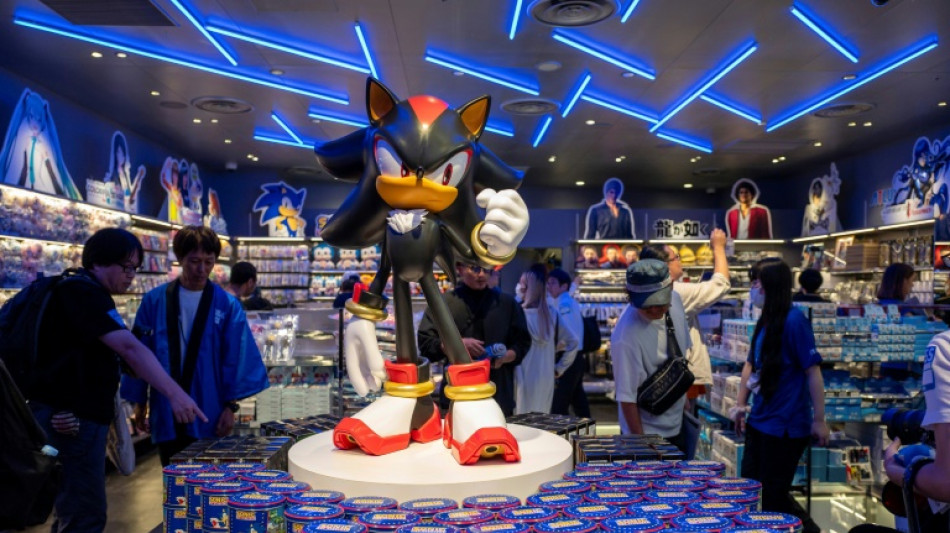

Japan's Sega eyes return to 1990s gaming glory
The big-screen success of 1990s video game speedster "Sonic the Hedgehog" has brought new fans to Japan's Sega, which says it is poised for a comeback after two tough decades.
This year all eyes have been on Nintendo, whose Switch 2 recently became the fastest-selling console in history.
But unlike its former arch-rival, Sega has not sold gaming hardware since its Dreamcast console was discontinued in 2001, instead focusing on making games for other platforms.
Now, as record tourism to Japan helps boost global appetite for the country's pop culture, the company sees a chance to reinvent itself -- including through nostalgic game remakes and movie adaptations like the hit "Sonic" series.
Sega opens its first flagship merchandise store in Japan on Friday, having launched a similar shop in Shanghai in May.
"Opportunities are expanding," chief operating officer Shuji Utsumi told AFP. "We've been struggling... for a while, but now we are coming back."
The company aims "to expand our business globally rather than focusing on the Japanese market", he said.
Sega was a top industry player in the 1980s and 1990s, its name synonymous with noisy arcades, home consoles and game franchises, such as beat-em-up "Streets of Rage" and ninja series "Shinobi".
But it struggled to keep up with intense competition, falling on hard times financially as multiplayer online titles from US publishers, such as "World of Warcraft", took off in the 2000s.
- 'Persona' movie? -
After Sega quit the hardware business, its game offerings "got a little stale", said David Cole of the US-based games market research firm DFC Intelligence.
But "the kids who grew up in the 1990s are now in their 30s, 40s, even older, and really like those franchises" -- and are introducing them to their own children -- he told AFP.
"It's untapped value" that Sega -- just like its Japanese peers including Nintendo -- is trying to capitalise on through new movies, stores and theme park rides, Cole added.
Last year, the film "Sonic the Hedgehog 3" starring Jim Carrey as the villain zipped to the top of the North American box office in one of the best December openings in years.
It followed the first live-action "Sonic" movie in 2020, as Sega cashes in on a video-game movie craze that saw "The Super Mario Bros. Movie", based on the Nintendo characters, become the second-highest grossing film of 2023.
"Shinobi" is also being turned into a film, while Sega's "Yakuza" game series has been adapted for television.
When asked if cult franchise "Persona" could be next, Sega's Utsumi said fans should "stay tuned".
"We are talking to a lot of interesting potential partners. So we are under some discussions, but I can't say too much about it," he said.
- Super Game -
Sega bought Finland's Rovio, creator of "Angry Birds", in 2023, seeking to expand into the mobile gaming market.
"Gamers' behaviour has been changing" since Sega's original heyday, going beyond TV-connected consoles, Utsumi said.
But Cole said that in the long run Sega should concentrate on "high-end" gaming: larger-scale, more involved titles that encourage brand loyalty.
Sega is working on what it calls a "Super Game" with big-budget international ambition and a scope that is "not only just a game -- communication, social, maybe potentially AI", Utsumi said.
"The competition in the game market is very fierce," he cautioned.
"It's important to really have a fan base close to us. But at the same time, when we develop a great game, it takes time."
Sega's parent company Sega Sammy also makes arcade and gambling machines, including those used in Japanese "pachinko" parlours, whose numbers are in decline.
That makes Sega's entertainment business "really the growth opportunity for the company", Cole said.
Sega Sammy said in May its "Sonic" intellectual property "has contributed to an increase in both game and character licensing revenue".
Young tourists in Tokyo shopping near Sega's new store ahead of the opening seemed to confirm this.
"I've always liked Sega. I kind of grew up around their games," said 19-year-old American Danny Villasenor.
"They're pretty retro. But I think they've evolved with time pretty well."
William Harrington, 24, who lives in Los Angeles, said his father "put me on to a lot of the older games back in the day", and so to him, Sega "feels like childhood".
E.Heinen--JdB


